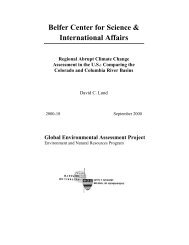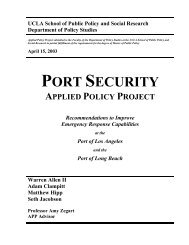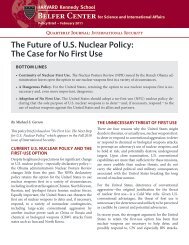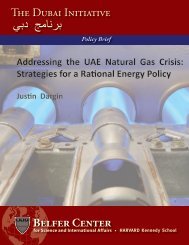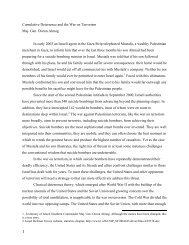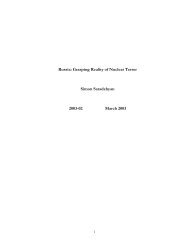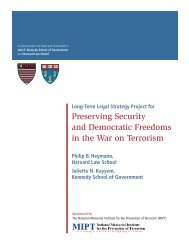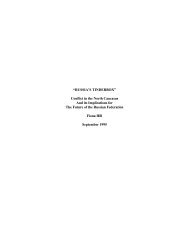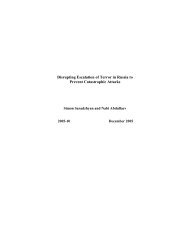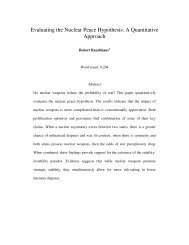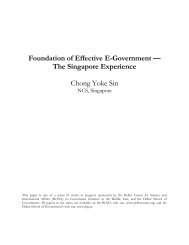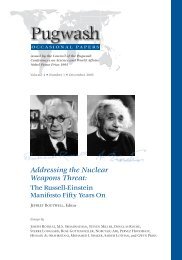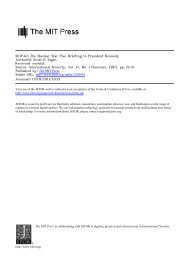The Heart of the Matter Valerie M. Hudson, - MIT Press Journals
The Heart of the Matter Valerie M. Hudson, - MIT Press Journals
The Heart of the Matter Valerie M. Hudson, - MIT Press Journals
Create successful ePaper yourself
Turn your PDF publications into a flip-book with our unique Google optimized e-Paper software.
forms <strong>the</strong> o<strong>the</strong>r explanatory variables. In <strong>the</strong> fourth possible comparison (level<br />
<strong>of</strong> democracy/physical security <strong>of</strong> women in reference to SOCIC), <strong>the</strong> pseudo<br />
R-squareds are too close to represent a meaningful difference, though technically<br />
<strong>the</strong> pseudo R-squared for <strong>the</strong> physical security <strong>of</strong> women measure is<br />
higher than that for level <strong>of</strong> democracy.<br />
Multivariate regression allows us to control for <strong>the</strong> alternative independent<br />
variables. Although space does not permit all three tables <strong>of</strong> multivariate results<br />
to be displayed, <strong>the</strong> appendix presents <strong>the</strong> multivariate regression <strong>of</strong> GPI<br />
on all four independent variables. In this analysis, <strong>the</strong> best signiªcant discrimination<br />
is also obtained with <strong>the</strong> PSOW scale, as compared with <strong>the</strong> o<strong>the</strong>r three<br />
variables (see appendix). Especially noteworthy in <strong>the</strong> multivariate analysis is<br />
that <strong>the</strong> discrimination afforded by PSOW dwarfs that provided by level <strong>of</strong><br />
democracy.<br />
<strong>The</strong>se results indicate that if a scholar or policymaker had to select one<br />
variable—level <strong>of</strong> democracy, level <strong>of</strong> wealth, prevalence <strong>of</strong> Islamic culture, or<br />
<strong>the</strong> physical security <strong>of</strong> women—to assist <strong>the</strong>m in predicting which states<br />
would be <strong>the</strong> least peaceful or <strong>of</strong> <strong>the</strong> most concern to <strong>the</strong> international community<br />
or have <strong>the</strong> worst relations with <strong>the</strong>ir neighbors, <strong>the</strong>y would do best by<br />
choosing <strong>the</strong> measure <strong>of</strong> <strong>the</strong> physical security <strong>of</strong> women.<br />
Conclusion<br />
<strong>The</strong> <strong>Heart</strong> <strong>of</strong> <strong>the</strong> <strong>Matter</strong> 41<br />
We ªnd conventional empirical warrant for hypo<strong>the</strong>ses linking <strong>the</strong> security <strong>of</strong><br />
women and <strong>the</strong> security <strong>of</strong> states. <strong>The</strong>re is a strong and statistically signiªcant<br />
relationship between <strong>the</strong> physical security <strong>of</strong> women and three measures capturing<br />
<strong>the</strong> relative peacefulness <strong>of</strong> states. Fur<strong>the</strong>rmore, in comparative testing<br />
with o<strong>the</strong>r conventional explanatory factors assumed to be related to such<br />
measures <strong>of</strong> state security—factors including level <strong>of</strong> democracy, level <strong>of</strong><br />
wealth, and prevalence <strong>of</strong> Islamic civilization—<strong>the</strong> physical security <strong>of</strong> women<br />
explains more <strong>of</strong> <strong>the</strong> variance in <strong>the</strong> same three measures <strong>of</strong> state security in<br />
both bivariate and multivariate analysis. We hasten to add that we view <strong>the</strong>se<br />
results as a preliminary excursion into a methodologically conventional research<br />
agenda linking <strong>the</strong> security <strong>of</strong> women and <strong>the</strong> security <strong>of</strong> states. Much<br />
more in <strong>the</strong> way <strong>of</strong> empirical analysis must be performed before <strong>the</strong>se results<br />
can be considered authoritative; in addition, we believe that unconventional<br />
methodologies also <strong>of</strong>fer important insights that must not be overlooked in <strong>the</strong><br />
quest for conventional warrant. Never<strong>the</strong>less, even in preliminary form, <strong>the</strong>se<br />
are challenging and provocative results.



